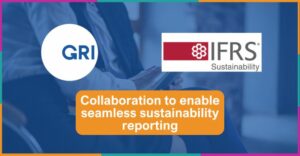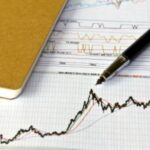
The IFRS Foundation and the Global Reporting Initiative (GRI) are deepening their working relationship, building upon the Memorandum of Understanding signed in 2022. This collaboration seeks to provide a seamless, global and comprehensive sustainability reporting system for companies looking to meet the information needs of both investors and a broader range of stakeholders.
The increased collaboration will optimize how GRI and ISSB Standards can be used together to facilitate reporting on an organization’s impacts, risks and opportunities, including risks that arise from the organization’s impacts.
The International Sustainability Standards Board (ISSB) and the Global Sustainability Standards Board (GSSB) have committed to jointly identify and align common disclosures that address information needs under the distinct scopes and purposes of their respective standards, for both thematic and sector-based standard setting. An initial outcome of the collaboration will involve a methodology pilot building on the recently published GRI 101 Biodiversity Standard and the ISSB’s upcoming project on Biodiversity, Ecosystems and Ecosystem Services.
The ISSB and the GSSB will continue to make decisions separately in accordance with their established standard-setting due processes, including public consultation in respect of any proposed amendments to their respective standards regarding the alignment of common disclosures.
Chair of the IFRS Foundation Trustees, Erkki Liikanen said: “In March 2022, the IFRS Foundation Trustees signed a Memorandum of Understanding with GRI in recognition of the importance of ensuring compatibility and interconnectedness between our respective standards to benefit report preparers and users around the world. The IFRS Foundation Trustees believe today’s agreement solidifies and advances that MoU so that together we can reduce duplication, fragmentation and complexity in the sustainability disclosure landscape.”
Eelco van der Enden, CEO of GRI said: “GRI is fully committed to working with key partners to increase transparency by organizations around the world for their impacts, which cannot be achieved without consistent and clear sustainability reporting. From the outset, our collaboration with the IFRS Foundation has been built on a desire to ensure that GRI and ISSB standards can be used seamlessly together so that sustainability reporting is streamlined and robust. The announcement today marks an important step towards making that a reality.”
Carol Adams, Chair of the GSSB said: “The joint-working between the GSSB and ISSB seeks to foster closer integration on standard setting while reinforcing our distinct yet complementary positions within the global corporate reporting landscape. This new agreement recognizes our commitment to enhancing disclosures on an organization’s most significant impacts, as well as their sustainability-related risks and opportunities. The next stage, starting with biodiversity, builds momentum towards a fully aligned global standards system. We believe reporters and stakeholders, including investors, will welcome this step.”
ISSB Chair, Emmanuel Faber said: “As the ISSB moves into its next phase of work, including looking at nature and human capital and enhancing the SASB Standards, this advanced collaboration with GRI will strengthen our work. The ISSB’s focus continues to be on meeting the information needs of capital markets. Through this collaboration companies that wish to apply both the ISSB and GRI Standards to facilitate reporting to a broader range of stakeholders will be able to do so in a seamless way. My thanks to GRI and the GSSB for their ongoing partnership.”
The ISSB will continue to focus on meeting the information needs of investors about organizations’ sustainability-related risks and opportunities – more specifically, meeting the common information needs of primary users as defined in ISSB Standards.
The GSSB will continue to focus on meeting the needs of a broad range of stakeholders, including investors, about organizations’ most significant impacts on the economy, environment and people, and contribution to sustainable development.



